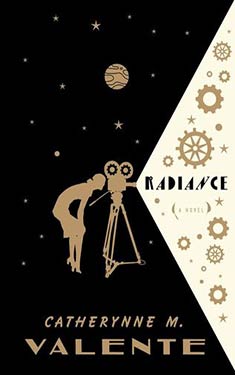Catherynne M Valente
Completed 4/17/2023, Reviewed 4/17/2023
3 stars
I have a mixed relationship with Valente. My favorite book by her was In the Night Garden, my least favorite, Palimpsest. This book is somewhere in the middle. What stands out about the books of hers that I have read has been their structure. This one was no different. Told through interviews, films, letters, and flashbacks, it recounts an investigation into what happened to the daughter of a famous director on Venus. It’s sort of an alternative universe, taking place in the first half of the 20th century, and assuming all the planets are easily reachable and inhabitable, like classic sci fi speculation. In addition, film is mostly silent and in black and white because the heir of Thomas Edison holds the patent for color and sound and rarely gives permission for anyone to use that technology. It’s an extremely interesting premise with lots of potential, but I found it mostly okay. This was a book club selection.
Severin Unck is a documentary film maker from Luna. Her father makes sweeping interplanetary romances and thrillers. Severin takes a crew to Venus to find out what happened to a settlement there. The only survivor is a boy she names Anchises. Then one by one, her crew dies until only a few are left. Severin disappears and the remaining crew and Anchises return to Luna. Then the studio and her father try to piece together what happened to the crew and the fate of Severin. There are interviews of the crew, letters from one of her stepmothers, treatments for a docudrama by her father, and the transcript of the few bits of film footage that remained from the Venus trip.
The star of the book is the form. There is no straight narrative describing anything. You have to piece together the events from fiction and non-fiction with mostly unreliable narrators. I found it both brilliant and annoying. After reading most of the book, I just wanted to be told, straight out, what the hell happened out there.
The prose is formidable. Like the form, I found it both brilliant and distracting. It often went on and on describing a scene or situation. Sometimes it was wonderful, sometimes irritating. I think the part of the book I liked the best was the interviews with Erasmo St. John, her sometime lover. They were low on prose, high on content. The treatments for the father’s movies were where it really bogged down. He was trying to come up with a way to tell the story of Severin’s disappearance in a fictionalized form from the point of view of Anchises. He does it initially as a noir detective film, then as a kind of fairy tale, finishing as a post-modern murder story. This made it quite confusing, requiring the reader to change gears throughout the book.
It is difficult to say if I liked any of the characters because some were real while most of the others were fictional within the fiction. I think that’s why I liked the Erasmo interviews. They were “real”. The characters do develop though throughout the book. You get the sense that they were all authentic. I wanted to like Anchises but he kept changing as the film he was in kept changing. We get to know Severin as a child, but as an adult, only through the film footage from Venus. The father, Percival, was kind of a jerk, having seven ex-wives as well as a lover or two. In fact, we never know for sure who Severin’s mother was.
I give this book three stars out of five. I contemplated four stars because of the form, but I just couldn’t say I had gotten into the whole book. Valente is quite a writer, though. Even when she doesn’t succeed (from my perspective), the books are still forces to be reckoned with. I have another book by her which I’ll probably get to in the next year or so. We’ll see how that one pans out.

No comments:
Post a Comment